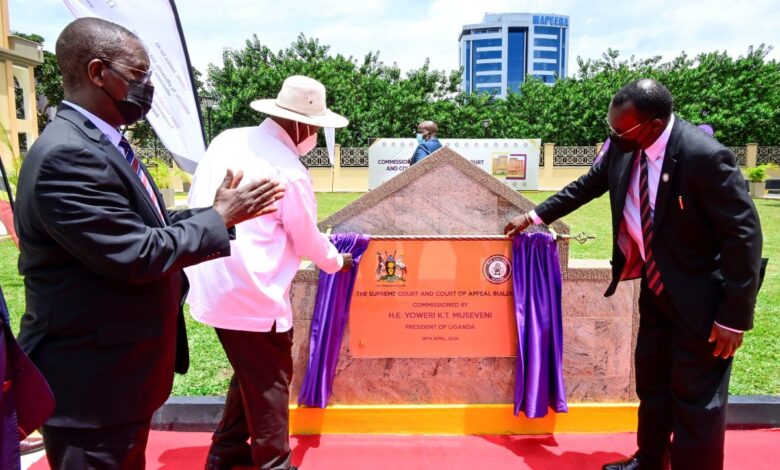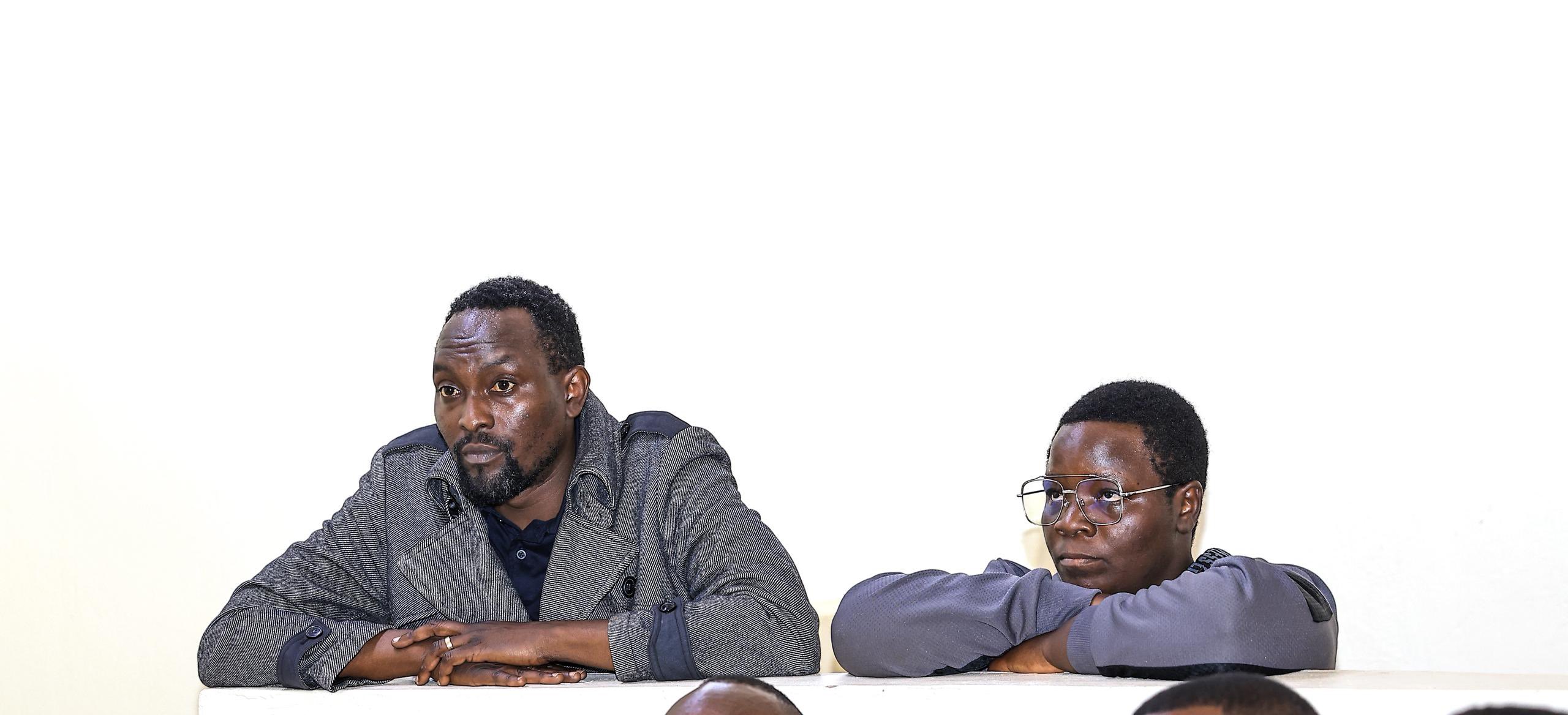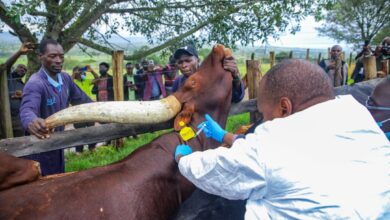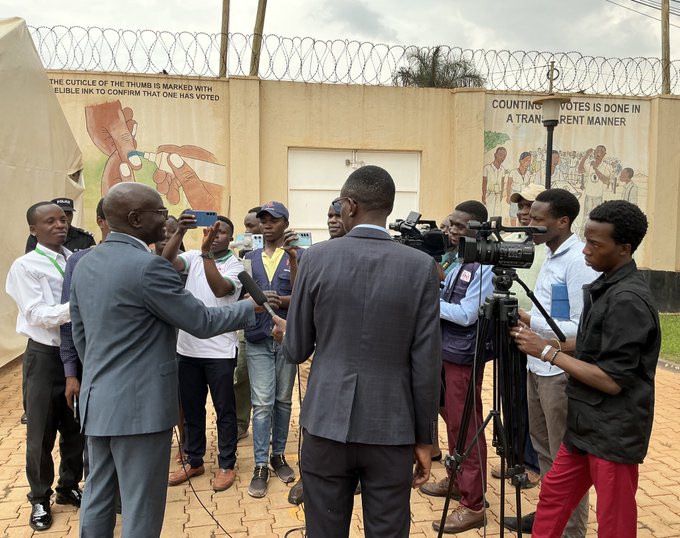Museveni commissions new Supreme Court and court of appeal buildings
President Museveni, on the other hand, assured the Judiciary that the government still maintains its target of increasing the court system budget to Shs800 billion.

President Yoweri Kaguta Museveni has today commissioned the newly built Supreme Court and Court of Appeal buildings at the Judiciary Headquarters in Kampala.
During the commissioning, President Museveni congratulated the Judiciary and the government of Uganda for funding and putting up the two modern structures.
“This was all done with the government money. It was not a grant from some place or a loan. Now this proves what the NRM government has been telling you. We told you that there’s nothing that you cannot do but we need to plan and prioritise. This is what we really advise Ugandans. Don’t try to touch too many things because if you try to do so, you end up doing nothing,” he said.
“The commissioning of this building confirms that there’s nothing that you cannot do, if we prioritise. Everything is important but what do we need immediately that cannot wait? And which one should we handle to push us to a higher threshold? If we take that line, we shall manage and we are managing.”
President Museveni, on the other hand, assured the Judiciary that the government still maintains its target of increasing the court system budget to Shs800 billion.
“We were moving then we had these interruptions like Corona among other problems. Now for instance the pressure we have now, in our efforts is to add value to our raw materials, we have got markets like that of value-added coffee to the Balkans. We have a duty to feed that market. These are the manoeuvres we must deal with. It is not like we have forgotten anything. I can assure you we have that plan of Shs800 billion and there’s a way we arrived at it.”
President Museveni also reminded the Judicial officers how the National Resistance Movement (NRM) government managed to revive the economy of the country through planning and prioritising.
“By Independence, when this High Court was here (the old one), Uganda’s economy was what we called an enclave; a colonial enclave economy where you had a small island of modernity surrounded by a sea of underdevelopment. That enclave economy was being described as the economy of the 3Cs and 3Ts by 1962. The 3Cs were cotton, Coffee and copper and the 3Ts were Tobacco, Tea and Tourism. This was from 1961 up to 1971 when Amin came in. When Amin came in, in addition to killing people like Ben Kiwanuka and many others, he destroyed the small island of the modern economy. Cotton and copper disappeared completely, coffee continued limping on. Tourism disappeared completely, tea declined from 23 million kilograms a year to 3 million kilograms and tobacco kept on limping,” he said.
He explained that when they came to power in 1986, there was almost universal underdevelopment.
“When we came in, we aimed at a number of phases. Phase one was what we called minimum recovery to bring back the small island of the money economy surrounded by those who work for only the stomach, this you can see with tourism, it came back, coffee was maintained, cotton came back a little bit, tea came back, copper we have not yet succeeded in bringing it back. Phase two was to expand that small island which we have done, for instance coffee has moved from 2 million bags to now 9 million bags, tea has gone from 3 million kilograms to now 60 million kilograms, tourism has been restored and expanded,” he said.
“The third phase is diversification by bringing other things into the money economy. For example, maize was never a cash crop but now it’s one of the major cash earners, milk is also now a big commercial product. The fourth element has pushed the economy to 55 billion USD but when we sat with the planners, I convinced them that all this expansion is mainly quantitative by expanding the production of raw materials mainly.”
President Museveni further noted that what the government is now focusing on is value addition to raw materials in order to enable the country’s economy to jump from 55 billion USD to 500 billion USD.
“We no longer want to hear about an economy of 55 billion USD or 60 billion because that is expansion within the pre-industrial stage. We need to have a qualitative jump to become an industrial country by adding value. We have just entered the door of lower middle income, but we have the base already to jump from that level to the high middle income because unlike all the other countries, for us we have got everything. We have the human and natural resources. The only thing we don’t have is direct access to the ocean,” the President stated.
“In this jump, we are going to add value to all these raw materials. This is the effort that will push our effort up but that is not the only one. There’s another economy which we are developing now; this is the knowledge economy. It is not just adding value to raw materials but using knowledge to create products like automobiles such as Kiira Motors, the vaccine development. These are all the priorities we are struggling with.”
The Chief Justice, His Lordship, Alfonse Owiny-Dollo said the commissioning of the two appellate Courts was indeed a historic milestone in the light of the history of the Judiciary of Uganda.
He thanked President Museveni for his personal undertaking and unwavering commitment to provide a home for the two appellate Courts.
“Since 1967 when the Court of Appeal was created, through to this day, the Court of Appeal and the subsequent Supreme Court have not had a home. The Court of Appeal sitting as the Uganda Court of Appeal, sat in the High Court Building. The independent Uganda Court of Appeal following the collapse of the East African Community, and the Supreme Court later created, have both sadly been homeless wanderers – moving from rented premises in Mengo, Parliament Avenue, Kololo, Twed Towers on Kafu Road, Nakasero – till this historic day when we witness the joyous acquisition of their respective homes,” Justice Dollo said.
“Operating Courts in rented premises compromise the security of the Courts. Second, the Courts would operate in premises designed as business arcades or residential apartments with unsuitable facilities often shared with bars, banks, restaurants and other businesses not compatible with Court work. Furthermore, cases can arise where the Landlord is a litigant and the same court is naturally to preside over the case. There are also instances where rent payments are delayed and the Landlord threatens to evict a Court or to take the Court to court for non-payment of rent.”
The Deputy Chief Justice, His Lordship Richard Buteera, as the Head of the Court of Appeal/Constitutional Court expressed gratitude that they now have a home where they will be sitting permanently without interruptions of other businesses not related to court activities.
“That is no more. I wish to thank the Government of Uganda headed by His Excellency the President of The Republic of Uganda Gen. Yoweri Kaguta Museveni for the strong financial and moral support offered to the Judiciary in respect of infrastructural development and other activities of Judiciary aimed at improving access to Justice,” he said.
The Permanent Secretary- Judiciary, Mr. Pius Bigirimana thanked the President for his support when he directed those funds be made available by enhancement of Judiciary budget in the year 2021/22, saying this was a game changer in the life of this project.
“The Procurement was transparent. That is why there were no administrative reviews. Thanks to the then Contracts Committee Chairperson headed by H/W Sarah Lang Siu, the current Chief Registrar who ensured fairness and transparency in the procurement process,” he said.
Mr. Bigirimana also noted that with the Supreme Court and Court of Appeal in place, the Judiciary will now save Shs6 billion annually which the institution has been paying as rent for the two courts.







